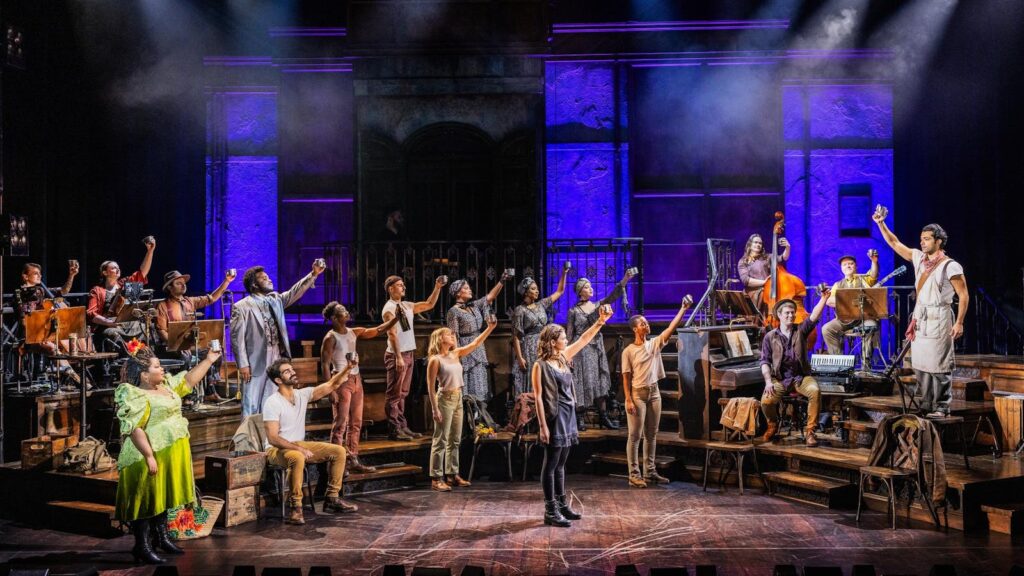Over the weekend, the touring cast of the Tony and Grammy award-winning musical *Hadestown* performed the fan-favorite show at the Providence Performing Arts Center. From the cast’s first entrance to the show’s final notes, *Hadestown* embodies the best of musical theater. For two and a half hours, the musical’s compelling storytelling and emotionally complex characters deftly swept up viewers in a tale of love and heartbreak.
Written by Anaïs Mitchell and originally directed by Rachel Chavkin, *Hadestown* retells the Greek myth of Orpheus and Eurydice, interwoven with that of Hades and Persephone. Friday’s performance, directed by Keenan Tyler Oliphant, starred Jose Contreras as Orpheus and understudy Julia Schick as Eurydice.
In the original myth, Orpheus, a musician touched by the gods, falls in love with a beautiful woman named Eurydice. He marries her, only for her to die shortly after their wedding. A grief-stricken Orpheus then ventures to the underworld to visit Hades, who— with the help of Persephone— is convinced by Orpheus to let him bring Eurydice home. But there’s one condition: Orpheus must not turn around to look at Eurydice. If he does, she will be trapped in Hades’s realm forever. In the tale, Orpheus turns around, and Eurydice dies.
In *Hadestown*, Orpheus woos Eurydice with the promise of a song that will bring about spring and, with it, the end of famine and tragedy. But shortly into their marriage, Eurydice loses hope that Orpheus will finish the song before she starves. Seemingly left with one option, she is lured into making a deal with Hades, played by Nickolaus Colón, trading her mortal life of hunger and desperation for the security Hades promises.
The story is narrated by the god of messengers Hermes, portrayed by Rudy Foster, who guides the audience through the heart-wrenching journey of Orpheus and Eurydice with pure talent and artistry. Mitchell’s exceptional songwriting prompts audiences to grapple with the necessarily heavy-handed nature of the show’s political commentary, engaging with themes of gender, capitalism, and fascism.
Multiple moments elicited strong audience reactions—from tears to gasps—throughout the show. A core tenet of the musical’s plot is the construction of a wall surrounding Hades’s domain. *Hadestown* was written long before President Trump launched his campaign to build a wall along the U.S.-Mexico border, but the song “Why We Build The Wall” delivers lyrics that resonate deeply with modern resistance to unjust American border policies.
As Hades looms over his laborers, his deep voice booming, sporting a designer-looking suit and showing off a tattoo of a brick wall, he sings:
“Why do we build the wall, my children, my children?”
The nameless workers, who—like Eurydice—signed their contract without any alternative, respond:
“We build the wall to keep us free.”
Colón’s Hades continues singing almost angrily, asking his workers:
“How does the wall keep us free?”
The workers reply:
“The wall keeps out the enemy.”
Hades then asks:
“Who do we call the enemy?”
And the workers respond:
“The enemy is poverty.”
Amid these salient political references, the show’s bittersweet optimism is especially moving. Near the beginning of the show, in the song “Livin’ It Up On Top,” Orpheus sings:
“And if no one takes too much, there will always be enough
(Persephone) will always fill our cups
And we will always raise them up
To the world we dream about, and the one we live in now.”
With Orpheus’s voice booming through the theater, despair immediately moves from the stage and into the audience’s hearts.
The fear of tyranny and the fight to survive at the heart of *Hadestown* are incredibly poignant today, making the show a masterclass in how art can resonate politically.
In addition to the show’s striking political themes, the love stories between Orpheus and Eurydice and between Hades and Persephone (played by Namisa Mdlalose Bizana) are full of intense complexities. For Orpheus and Eurydice, whose relationship is imbued with palpable chemistry between Contreras and Schick, the show forces audiences to ask whether love is powerful enough to supersede basic needs.
On the other hand, Hades and Persephone’s relationship confronts audiences with questions about how to appeal to the internal humanity of a tyrant and whether tyrants can change their ways.
Down to the last note, the show’s beautiful melodies underscore the power of art and expression in the face of fascism, forcing theatergoers to grapple with how one can tell a story destined to lead to despair.
*Hadestown* is a deeply moving and thought-provoking experience that cements its place as a modern musical theater masterpiece.
https://www.browndailyherald.com/article/2025/11/hadestown-shines-with-political-relevance

